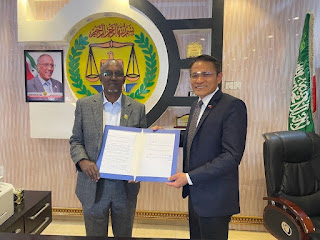Osman Badiyow has pioneered the Ponseti method in his country, helping at least 350 children to walk – free-of-charge
It took the team three weeks to persuade Micraj, now six, that she could walk after their treatment.
Born with a club foot, which botched surgery did not improve, the little girl was understandably hesitant that things could change.But the team at the Somali Red Crescent Society (SRCS)-run Mogadishu physical rehabilitation centre persevered. And her mother remembers watching her take her first, faltering steps.
“When we see something good, we say ‘Mashallah’ [God was willing],” Foos Artan Isse says, speaking to The Telegraph over Zoom from the centre. “I was so happy to see her walking. I felt like she has a future now.”
Micraj is one of hundreds of children treated by one remarkable man, Osman Ibrahim Mohamed, one of only four physiotherapists in the whole of Somalia.
In total, he and his team have helped 351 children to walk, free of charge, since establishing their clinic two years ago. They plan to reach 500 by the end of this year.
For Mr Mohamed, they are his life’s work.
“What will I leave after I die?” he says. “I have this. My dream is coming true.”
Mr Mohamed, who goes by the nickname Osman Badiyow, uses the Ponseti method for treating children with club foot – widely seen as the gold standard worldwide.
In fact, he pioneered the use of the treatment in his country.
Club foot is a common condition, first documented by Hippocrates in 400 BC, where babies are born with either one or both of their feet turning inwards.
Untreated, it is one of the leading causes of disability worldwide, with around 7.5 million people living with it globally in low and middle income countries.
It runs in families, and is caused by the Achilles tendon at the back of the foot being too short. It affects around 1 in 1,000 babies in the UK, including footballer Steven Gerrard. Nearly all are treated successfully and learn to walk, take part in physical activities, and wear regular shoes.
That is almost entirely due to the widespread use of the Ponseti method, which involves gently manipulating and stretching the foot soon after birth, and putting it in a cast, every week for five to eight weeks. A minor operation then loosens the Achilles tendon, and special boots worn overnight until a child is around five help prevent the condition returning.
Osman Badiyow is the first person to bring the treatment to Somalia, where basic services have been severely damaged by decades of war and insecurity.
His quest to bring the low-cost, low-resource method to his country has taken more than 20 years: he wrote his thesis on club foot while studying in Tanzania in 1999, but it took until 2014 for him to get on a course that would teach him how to use it in reality.
In between, in his work at the SRCS, he and the team treated many club foot patients, but often without success despite many months of work.
“So I said to myself, Osman, you are missing something – maybe this Ponseti method is the one you can use to help the children,” he says.
He then wrote personally to Dr Ignacio Ponseti, the inventor of the method in the 1950s (he has since died), in a bid to get the training he needed.
I said, ‘I’m living in Somalia and we have a lot of children affected by club foot that we are trying to correct and we cannot help, and the mothers and children of Somalia are suffering. Can you help me get a course?’, he remembers.
Dr Ponseti, a Spanish-American physician, came through, finding a course for Osman in Iowa and sponsoring his journey; but his visa was denied by the United States authorities. Eventually, with help from a number of organisations, Osman managed to get on a course in Ankara, Turkey in 2014 - but the students were only allowed to practise on plastic models.
With the help of an organisation called Miracle Feet, a global nonprofit aiming to eliminate untreated clubfoot worldwide, and the Global CIubfoot Initiative, Osman was finally able to learn the method on real patients in 2016.
It takes several people to actually conduct the Ponseti method, so more training was needed for team members, including in Kampala, Uganda, over the next few years.
The clinic in Mogadishu officially opened in 2019, two years ago, backed by Miracle Feet, at the rehab centre run by the SRCS with funding from the Norwegian Red Cross.
But even then, the struggle was not over. The first patient Osman remembers treating was a little boy whose father, who lived in an IDP camp, did not believe could be helped. HIs grandmother brought him to the centre.
“The father said, this is God’s punishment… but then we saw that he had corrected it and he said thank you very much, I was not aware it could be helped,” says Osman.
For children with club foot who are untreated, there is a huge stigma; often, they do not attend school, work, or live as part of normal society.
If you get disability in Somalia, it is like going to hell,” says Osman. “Even able-bodied, they are suffering. So if you are disabled, it’s worse.
It is a hell experienced by many. Miracle Feet estimates that there are 25,000 people in Somalia with untreated clubfoot, and 800 babies born annually with the condition.
One of them was the daughter of the watchman at the SCRC rehabilitation centre where Osman works.
His name is Mohamud Fiidow Mohamud, and his daughter – now 7 – is Farhio. She had surgery elsewhere, which was then corrected and her condition treated by Osman.
“I feel lucky I knew about this,” Mr Mohamud says.
“This little girl, her mother passed away when she was 14 days old. Then I had the special worry about her case,” he adds. “But when I got her help, she is now walking, helping herself, and I am very proud.”
Farhio herself beams into the camera.
When asked what she wants to be when she grows up, she does not hesitate.
“I want to be a doctor,” she says.
Protect yourself and your family by learning more about Global Health Security
ByJennifer Rigby, GLOBAL HEALTH SECURITY CORRESPONDENT
sOURCE



